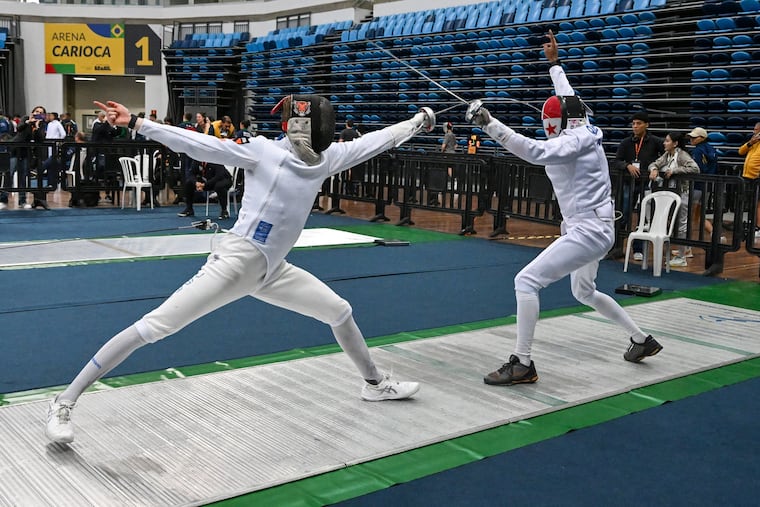How ‘Star Wars’ helped spark a Philly-area fencer’s rise to Pan American gold
Tristan Szapary, who watched Olympic champs while training at the Fencing Academy of Philadelphia, now beats them, and still finds time for neuroscience.

At a young age, Tristan Szapary took up fencing partially because of his love for Star Wars. Little did Szapary know that his obsession with lightsabers, along with many hours of training, would lead him to a win over an Olympic gold medalist in the Pan American Championships in June.
“I came from a pretty sporty family. My sister ran Division I track at Brown; my dad and mom both ran, so they wanted me to play a sport. I tried basketball, I tried soccer, but nothing really stuck,” said Szapary, who grew up in Wynnewood.
It wasn’t until he attended an extracurricular program at the French International School of Philadelphia that Szapary discovered fencing. Szapary attended the school from kindergarten through seventh grade and credits it for introducing him to his lifelong passion.
“It’s funny because when they first start you in a fencing class, they don’t actually give you the swords; we were basically just doing footwork,” Szapary said. “But I didn’t complain about it, and my parents thought, ‘All right, this is kind of his thing now,’ so they sent me to Fencing Academy of Philadelphia.”
Szapary trained under coach Mark Masters, who founded the academy in 1989 and has trained fencing champions of all ages. And while the academy, also known as FAP, is not big in size, the coaching there played a huge part in Szapary becoming an elite fencer.
“Some other clubs in New York or Texas or out on the West Coast are really big powerhouses. For us, we only had eight [fencing] strips, but it was the quality of coaching that made the difference,” Szapary said. “To this day, people can still tell that I grew up fencing at FAP; that’s how distinct it is.”
While training at FAP, Szapary won team gold at the Basel Junior World Cup, team silver at the Belgrade Junior World Cup, and individual silver at the November North American Cup, among other accolades.
The Friends’ Central grad knew he wanted to continue fencing in college, but strong academics were equally important to him. The first place he toured was Princeton, and he was immediately intrigued by the prestige of the university, even if he had some initial concerns about being able to balance Ivy League coursework and fencing.
Szapary ended up choosing Princeton, where he excelled on the fencing piste, even after losing his freshman season because of COVID-19. He competed in épée, one of the three disciplines of fencing, in which the objective is to touch or strike any area of the opponent’s body with the tip of the weapon to score points. Szapary made the All-Ivy League team in all three years he competed and was a two-time All-American. As a senior, he won the NCAA épée championship.
Yet even after proving he was one of the best in the country at his discipline, Szapary wasn’t afforded the opportunity to compete in the 2024 Paris Olympics, as the United States men’s épée team failed to qualify after a fencer’s outburst at the 2023 Pan American Games cost the team critical qualifying points.
“I was pretty devastated when we were the only squad across foil, sabre, and épée, men’s and women’s, not to qualify,” Szapary said.
Although Szapary didn’t compete at the Olympics, he still got to participate. U.S. women’s épée coach Natalie Dorset offered him a role as a training partner.
“I was overjoyed because what that meant is that I still had an opportunity,” Szapary said. “Training the women was super fun and gratifying.”
But Szapary still wanted to compete and reached the final of the Pan American Senior Fencing Championship last month in Brazil. Standing between him and a gold medal was Ruben Limardo, a five-time Olympian and the épée gold medalist in 2012.
“Ruben is a legend in our sport; he’s a hall of famer,” Szapary said. “I was honored just to be on the strip against him.”
Szapary, 23, quickly put his admiration for his opponent aside and cruised to a 15-7 victory. It was a full-circle moment, as he remembered watching Limardo win the Olympics when he was just starting to fence, back when he still thought of the épée as his lightsaber.
After serving as a training partner in the 2024 Olympics, Szapary would love to compete in Los Angeles in 2028. However, with the Games being so far away, he’s taking it day by day.
“If I could just choose to compete in the Olympics, I would, but I’ve seen how stressful and emotional an Olympic season can be and realized that thinking ahead doesn’t actually help me reach that goal,” he said.
His career aspirations also have made him uncertain about committing to the Olympics. Szapary is working in a lab studying neuroscience at Columbia and has ambitions to attend medical school. He majored in neuroscience at Princeton partially because of his grandmothers, who dealt with severe brain tumors.
“At a young age, [I saw] how tough it is to deal with a loved one whose memory goes before they actually go. So that stemmed my interest in neuroscience,” Szapary said.
One of Szapary’s grandmothers was responsible for introducing him to Star Wars, the franchise that sparked his love for fencing. Szapary continues to fence regularly, balancing the sport with his burgeoning neuroscience career, and plans to embrace whatever opportunities come next, whether it be on the piste at the Olympics or in the lab.